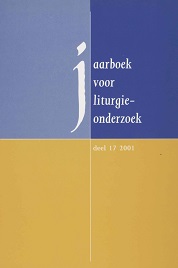De zegening in fenomenologisch perspectief. Essay van postmoderne sacramento-theologie
Abstract
We concentrated on the paradigm shift (metaphysical versus phenomenological model) in studies concerning blessings in the Catholic tradition. The theological history of blessings reveals multi-facetted approaches to the phenomenon. In the Middle Ages the meaning of blessings evolved to pure supplications and pleas for mental and especially material prosperity, and the original meaning of praise and laudation for God got lost. That situation docs not change until the Second Vatican Council. In 1984, in the aftermath of that council, appears a new book of blessings (Benedictionale Romanum) that rediscovers the full riches of blessings and that lends itself well for a phenomenological approach. Most important in the blessing ceremony is the fact that a Christian community gathers and that expressions of thanks and praise prevail. A barrier is raised against a magical interpretation of blessings by emphasizing eulogy, the Word of God, and prayer instead of supplication. After the ritual we are send into the world not only with a spiritual, but also with an ethical task; by blessing our neighbour and the whole of creation, we bless God and God blesses us. Only in this way, a blessing can be a form of expression of divine salvation.


